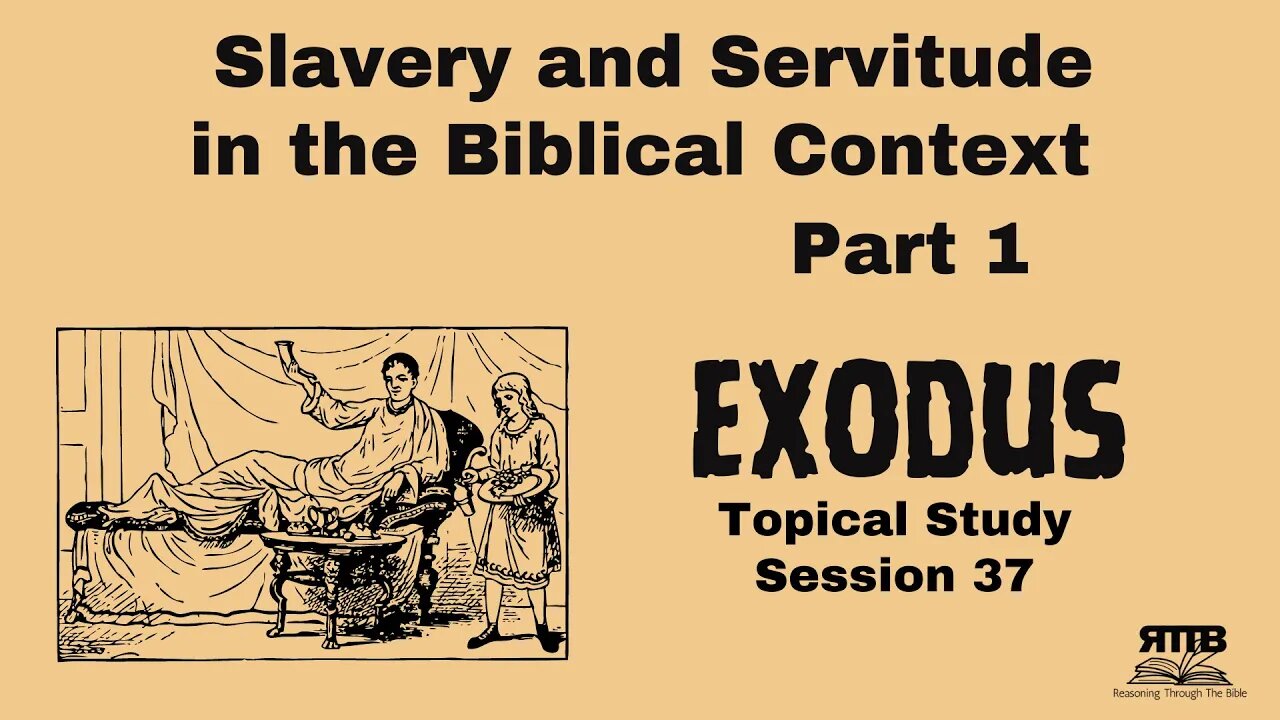Premium Only Content

Understanding Slavery and Servitude in the Biblical Context || Exodus Topical Study || Session 37
What if you could get a comprehensive understanding of slavery in the Bible from a historical perspective? Today's deep-dive session offers just that. We navigate through the complex subject of servitude, analyzing the Hebrew words 'ebed’ and 'abad' and their translated meaning in various Biblical passages. We also examine the different types of bondslave arrangements during Biblical times. We shed light on how the Mosaic Law not only addressed servitude but also directly prohibited all people from being kidnapped and sold into slavery.
Ever wondered how concepts like dowries, bride prices, and voluntary slavery played out in the ancient world? Be prepared for some thought-provoking insights. In today's session, we scrutinize the cultural backdrop that shaped views on marriage and slavery during Biblical times. We bring to light how customs like dowries and bride prices, often seen as survival mechanisms, were prevalent in the ancient world. We draw examples from notable Biblical figure Jacob, who voluntarily became a bond slave, elucidating the stark contrast between the options available in ancient times and now.
Our exploration doesn't stop there. We delve deeper into the biblical perspective on slavery, discussing the issue of kidnapping in the ancient world and why the Mosaic Law prevented it. We look at instances like in Second Kings 4:1, where a family was debt-bonded and the creditor seized the family members as a bond slave. Our episode is more than a dry historical account. It's a journey that takes you back in time, provoking thought and offering perspectives that enlighten your understanding of a sensitive issue that is used by modern critics, skeptics, and scoffers to divide people. We've woven together historical facts with Biblical teachings and cultural understandings, creating a tapestry that promises to challenge your assumptions and broaden your perspective. Tune in and be prepared to see the ancient world in its proper context.
All of the "Slavery" three part series are recommended for anyone facing skeptics, and atheists attempting to twist Scripture's clear meaning. This series is a must for students headed to college campuses where scoffers lay in wait to try and confuse a young Christian's understanding of God and their faith.
-
 31:22
31:22
Reasoning Through the Bible
10 months agoEarly Church Tensions || Galatians 2:11-14 || Session 9 || Verse by Verse Bible Study
181 -
 LIVE
LIVE
StoneMountain64
6 hours agoWARZONE LEGEND RETURNS. GHILLIE SUIT $20k TOURNEY.
152 watching -
 1:06:33
1:06:33
TheCrucible
2 hours agoThe Extravaganza! EP: 27 with Guest Host: Rob Noerr (8/26/25)
11.4K1 -
 LIVE
LIVE
GloryJean
8 hours agoHide & Seek Tournament w/ Spartakus, StoneMountain64 & Stevie
48 watching -
 LIVE
LIVE
Reidboyy
5 hours agoNEW FREE FPS OUT ON CONSOLE NOW! (Delta Force = BF6 with Killstreaks)
19 watching -
 1:37:26
1:37:26
Redacted News
3 hours agoHIGH ALERT! DID UKRAINE JUST DECLARE WAR ON HUNGARY? ZELENSKY DEMANDS MORE CASH FROM NATO | REDACTED
142K68 -
 LIVE
LIVE
Akademiks
5 hours agoDrake got finessed w/ Fake Chain? Drake vs hip hop media. Cardi B in court. Did Young thug SNITCH?
1,001 watching -
 9:00
9:00
Zach Humphries
1 day ago $0.30 earnedXRP and CARDAO working together now?
8.75K -
 58:42
58:42
Sarah Westall
2 hours agoIt’s Big Big Money – Trafficking People is Intertwined in Business & Politics w/ Natly Denise
20.4K2 -
 LIVE
LIVE
LFA TV
12 hours agoLFA TV ALL DAY STREAM - TUESDAY 8/26/25
1,067 watching